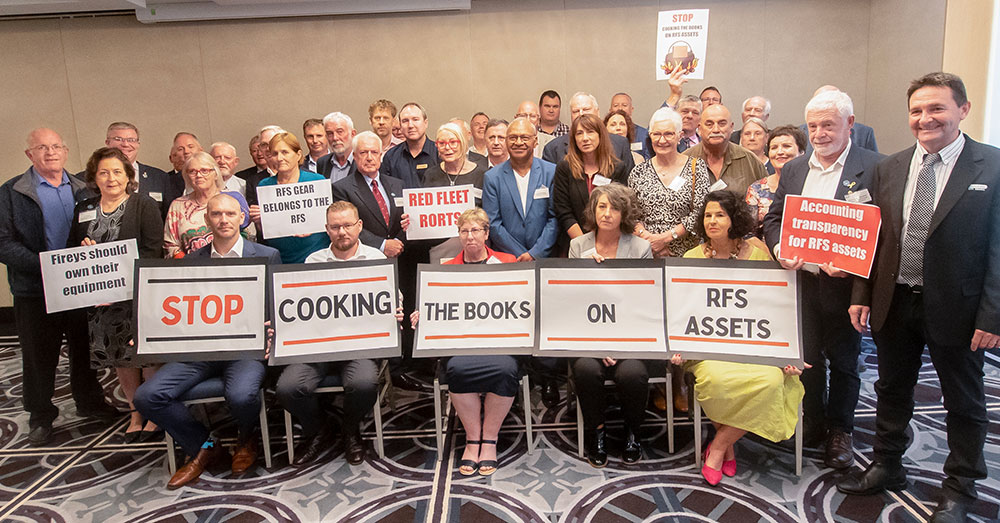
21 February 2023
250 discuss rural and regional challenges
I’m writing to you today fresh off the back of yesterday’s Rural and Regional Summit, in which 250 of us came together to discuss the acute challenges faced by non-metropolitan councils.
As you’ll see from the photo above, Summit delegates committed to the need for speaking with one voice on a range of issues – not least the ongoing Government practice of “cooking the books” when it comes to ownership and responsibility for Rural Fire Service (RFS) assets.
In short, the State Government is trying to force councils to take on financial responsibility for firefighting equipment. Now common sense suggests any equipment ordered by; used by; maintained by; and disposed of by the RFS is the property of the RFS. Yet the State Government claims this equipment is actually the property of councils, which must therefore fund the depreciation of these assets on their books.
It's not the first accounting sleight of hand we’ve seen, but it is one of the most insidious. If councils are forced to fund the depreciation debt of RFS equipment – and remember, this equipment they may never even lay eyes on – that’s money we can’t spend fixing and maintaining roads, parks, swimming pools, libraries, or to provide the services our communities so desperately need.
The Government’s own Local Government Accounting Code gives our councils the right to refuse to include RFS assets on their books. The catch is that if we exercise this right, we’re left with a qualified audit result … something we take very, very seriously as responsible managers of public money.
Our message is a simple one: clear up this mess once and for all by acknowledging that rural fire-fighting equipment controlled by the RFS is owned by the RFS.
We want true financial transparency and integrity returned to this process and we won’t stop until we get it – read the media release we issued yesterday.
Regional and Rural Health
Councils have been saying for years that rural and regional health is in crisis, and that we need urgent and real funding solutions from the state and federal governments.
We also need a renewed focus on community wellbeing and mental health right across NSW to bolster the resilience of our communities, particularly following disasters.
So it was unsurprising that the Summit’s terrific session on rural health, mental health and resilience reiterated our calls for all parties and candidates to commit to implementing in full the recommendations of the parliamentary inquiry into rural and regional health services.
Pleasingly, NSW Labor has pledged to implement all 44 recommendations of the inquiry, with the Coalition Government agreeing to 41 of the recommendations.
Drill down further into this crucial election priority in our Weekly Election Focus on Health article.
Rural and Regional Summit
It was terrific to see so many of you in person at yesterday’s Rural and Regional Summit, and again this morning at the Country Mayors' Association Leaders’ Debate. Many thanks to all our fantastic guest speakers.
Unfortunately, Local Government Minister Wendy Tuckerman did not seize the opportunity to recommit the current State Government to a new Intergovernmental Agreement of cooperation, in line with the commitment already received from the Opposition, it was pleasing that she recognises the Emergency Services Levy and rate peg methodology are real issues for our councils.
We welcomed the commitment to new and fairer grant guidelines given by the Member for Maitland, Jenny Aitchison, on behalf of Opposition leader Chris Minns. Similarly, the pledge to review the funding model for local government given by Opposition Local Government Spokesman Greg Warren is good news.
Yet financial sustainability is where we still need to see far more from all sides of politics. Cost sifting remains a serious and growing concern and the rate peg methodology is broken.
Overall it was a great day, and it was really terrific to see so many of our regional and rural councillors coming together as one to fight for our communities.
State Infrastructure Contributions – update
Like many of you, LGNSW sought immediate clarification from the NSW Government after finding updated information about infrastructure contribution reforms earlier this month. The update set out the NSW Government’s intention to introduce a State Infrastructure Contributions framework to NSW Parliament in 2023.
LGNSW wrote to DPE seeking clarification that the foreshadowed legislation would not involve or affect councils and local infrastructure contributions or introduce any statutory obligations on councils for increased housing targets to "incentivise" this reform.
Local government has always indicated its support for the setting of housing targets, but these must be evidence-based and developed with councils, guided by strategic plans. Councils also need to be confident that state agencies will provide the infrastructure required to support any additional growth in a timely manner.
DPE has responded to LGNSW assuring the local government sector that this proposed measure will not divert any money from councils, and is separate from the contributions developers pay to councils for essential local infrastructure. DPE also confirmed there are no intentions for councils to collect these state contributions on behalf of the NSW Government.
We will keep an active watching brief on this matter, which aligns with one of our key election priorities: all parties and candidates must pledge that local government will not be worse off under any future infrastructure contributions reforms.
Correspondence on this issue, including the DPE’s response, can be viewed by members on our website here and here.
Amplify our Advocacy
We’re now right in the thick of the State Election Campaign and over the next five weeks I’m urging everyone who cares about the future of councils and our communities to speak to your local candidates about the LGNSW pre-election priority most important to you.
You’ll find resources to help you in this in our downloadable Local Government Pre-Election Advocacy Toolkit, which is also available by emailing [email protected].
BACK TO MAIN PAGE